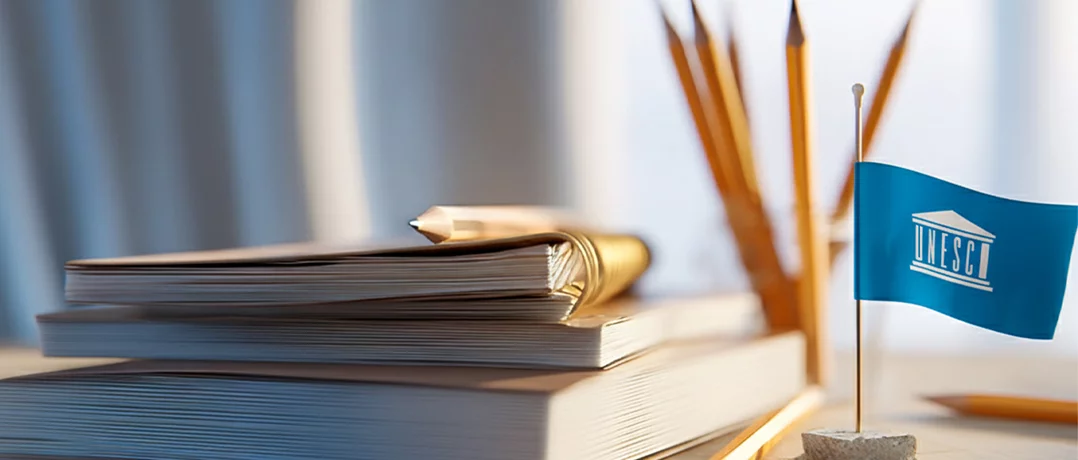UNESCO launches a regional education framework from Lebanon to rebuild resilient learning systems across crisis-affected Arab states.
Learning amid ruins: UNESCO’s new regional vision for education in crisis
Learning amid ruins: UNESCO’s new regional vision for education in crisis


In a region where classrooms have long become casualties of conflict, UNESCO has chosen Lebanon to launch its Regional Framework for Education in Emergencies in the Arab States, a plan designed to help countries rebuild not just schools, but resilience.
Across the Arab world, education systems have faced relentless shocks: wars, economic collapse, displacement, and crises that have stretched far beyond the temporary. It’s a sentiment shared by Mayssoun Chehab, UNESCO’s Regional Education Advisor, who told The Beiruter that the framework aims to respond to both ongoing and newly emerging crises, as well as to countries now transitioning out of them.
“The framework we’re launching doesn’t only respond to emergencies, whether chronic or new,” she explained. “It also supports countries that are just coming out of crisis.”
Chehab emphasized that the goal is to help education systems become adaptable and future-proof. “The framework supports these countries to have flexible systems that can reconcile short-term, mid-term, and long-term needs,” she told The Beiruter.
But the question that has haunted most regional and international initiatives remains: implementation. “In past experiences, the challenge was always in the application, not the vision,” Chehab acknowledged.
So how will UNESCO ensure this one does not stay on paper?
“This framework was the result of a broad participatory process with Arab countries,” she explained. “It was very important to listen to their core needs, because when a framework truly responds to real needs, implementation becomes far more meaningful.”
Chehab added that the framework’s success ultimately depends on national will:
“UNESCO isn’t the one implementing,” she said. “National leaderships will carry out the work. We’ll provide the support and guidance, but it all comes down to political will in each country. If that will and leadership exist, implementation becomes much more effective.”
A framework for resilience
The Strategic Framework for Education in Emergencies (EiE) outlines a unified vision to support countries in safeguarding education systems under threat. In practical terms, it draws from existing global tools, including the Comprehensive School Safety Framework, the Safe Schools Declaration, and the INEE Minimum Standards for Education: Preparedness, Response, and Recovery, to help countries build resilient, context-specific responses that protect both schools and students.
Expected initiatives from the two-day meeting include:
· Officially launch the UNESCO Regional EiE Strategic Framework and present its vision, priorities, and implementation pathways.
· Enhance visibility of EiE as a regional and global priority and highlight the urgency of EiE in the region and why a strategic, coordinated approach is needed now.
· Promote dialogue towards mobilizing political, financial, and technical support for the strategy implementation across the region.
· Strengthen collaboration among humanitarian, development, and peace actors across the Arab region.
Lebanon: Schools as spaces of healing
For Lebanon’s Minister of Education, Dr. Rima Karami, the meaning of education has evolved profoundly in the wake of the country’s compounded crises, from the economic collapse to the Beirut blast. Speaking exclusively to The Beiruter, she reflected on how the role of schools is changing:
“We are now in a transitional phase,” she said. “Many of our schools, especially private ones that were able to withstand these difficult circumstances, have started realizing that education cannot be limited to academics.” Dr. Karami stressed that the modern school must prepare students for citizenship, empathy, and collaboration, not just exams.“The school is a place where students train and practice to become members of society,” she explained. “It should prepare them for citizenship, teamwork, and self-understanding.”
For her, emotional intelligence and soft skills are as essential as knowledge.“The support we provide shouldn’t only be intellectual,” she told The Beiruter, “but also related to their emotions, feelings, and their ability to work together, what we call soft skills.” Lebanon’s new curriculum, she added, has already incorporated these ideas: “The new curricula, which are almost ready, have taken this into account,”
Dr. Karami likened the country’s current moment to a farmer tending to barren soil, waiting for growth that cannot yet be seen. Now it might look as if nothing is happening,” she said. “But like a farmer who takes care of the soil before the harvest, the beauty and the good fruits will come later.
Syria: Rebuilding hope
Few countries embody the urgency of this framework more than Syria, where years of war have left much of the educational infrastructure in ruins.
Speaking exclusively to The Beiruter, the Deputy Minister of Education of Syria underscored the sheer scale of the challenge: “Right now, our biggest challenge is finding a school seat for every student,” he said. “Because we have a huge number of destroyed schools, about 40% of our educational infrastructure has been damaged or destroyed.”
He added that he hopes the new framework will help mobilize international support: “Of course, such strategic frameworks will help draw the attention of many partners to the importance of standing with us and supporting us in this effort.”
A regional moment of reflection
Lebanon’s role as host for this launch was both symbolic and telling. Once renowned for its high literacy rates, Lebanon now faces its own education crisis, one fueled by economic collapse, mass emigration, and public-school shutdowns.
For many participants, the new framework represented more than a technical plan. It was a chance to rethink education as a safeguard of stability and identity, even in times of upheaval.
As Lebanon’s Minister of Education, Dr. Rima Karami likened the country’s current moment to a farmer tending to barren soil, waiting for growth that cannot yet be seen. “Now it might look as if nothing is happening,” she said. “But like a farmer who takes care of the soil before the harvest, the beauty and the good fruits will come later.”


